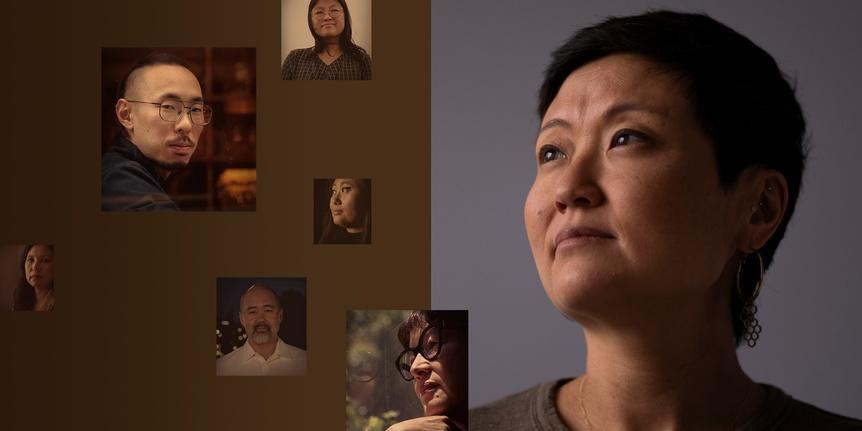♪ ♪ SUSAN POLLACK: Before the outbreak of war, we used to get all kinds of gossip about the darkness out there, so we didn't like going out.
When my mum occasionally, very rarely, left us, my brother and myself, we went under the table, because we were fearful of what might happen.
(train whistle blaring) (train engine chugging, rattling) What was the trip like?
About six to eight days, I suppose.
Many of the babies and children died along the way.
There was no water to drink.
None of us Jews actually who had been transported could realize what was awaiting.
Evil rages.
Evil rules.
And this was totally alien to our minds.
♪ ♪ (train engine chugging, rattling) YOUNG SUSAN: I just huddled up to my mum.
"It will be over soon.
Keep hoping."
(train engine brakes squealing) I remember the arriving very clearly.
When the doors opened up and the terror and the aggression hit us immediately.
(voices clamoring) The Germans were waiting.
They were shouting, "Get out!
Los!
Herein!"
(voices clamoring) There was a Hungarian-speaking victim warning us quietly: "Don't say you're younger than 15 years old."
And I just nodded, not understanding why.
That was what saved me from being sent to the gas chamber on arrival.
My mother, who was worn, fatigued, anguished.
She looked much older than her age.
She was in her 40s.
She was selected.
(footsteps) There was no parting words.
(footsteps crunching) There was just a hug and "I love you."
(footsteps) SUSAN: I lost so many members of my family.
I suppose to, to go forward, I needed to look ahead.
I could be irresponsible now.
(laughs) I try not to be, but I read a poem, and it says, "The dog is dead, the car is sold, go and live foolishly."
And I thought to myself, you've got it right.
(laughs) (rock music playing on stereo) (music fades) ♪ ♪ MANFRED GOLDBERG: Children grow up on experiences.
Some of the experiences, which may have been horrifying to adults, were just part of life.
But once we were incarcerated in the camps, um, I think we tended to grow up pretty fast.
♪ ♪ YOUNG MANFRED: We spent the war together.
Me, my mother, and my little brother Hermann.
I, as a 13-year-old, had to go out and do sort of a day's slave labor, But my brother was four years younger.
He was permitted to stay in the camp.
One day, we came home from work and Hermann and three other young kids who were allowed to stay in the camp had disappeared.
♪ ♪ During the day, they had been picked up by some SS members.
(woman crying in anguish) Since then, he appears to have vanished from the face of the earth.
(wind blowing) MANFRED: One hears of miraculous reunions where members of a family find each other after 60 years or more by pure chance.
And therefore, I have never recited any memorial prayer on his behalf, always making myself believe that maybe he's still alive.
(singing in German) MANFRED GOLDBERG: Last July I was contacted by an organization in our hometown with a view to placing some memorial plaque for our family.
This will actually be an acknowledgment that I consider my little brother to have been murdered.
(bird song) ♪ ♪ IVOR PERL: That's the problem with being a survivor.
Everything tends to remind you of something.
Seeing the trees right at the edge of the forest in the sunshine, it's very, very clear to me.
♪ ♪ (whistle blowing, engines rumbling) ♪ ♪ YOUNG IVOR: I was in the satellite camp of Dachau in Germany in 1945.
My birthday is in February, and I was bar mitzvahed, which means you're 13 years old.
And I remember going to the barbed wire and seeing the birds fly by, thinking to myself speaking to God, "Please, God, please, God, let me get out of this hellhole... ...and I'll never ask another thing from you for my life."
♪ ♪ One day, we're given a loaf of bread.
"You're marching."
We were marching from Allach to Dachau.
(voices clamoring, whistles blowing) The marching was horrendous.
My brother and I were fighting.
We accused each other of taking a bigger bite.
(footsteps approaching) "Why are you fighting?
"Don't fight because you're brothers.
You'll soon be liberated."
♪ ♪ (bombs falling, explosions) We heard some shells falling.
All you could hear was the whistling sound (bombs whistling) Further shells kept on falling.
And by that time you either had to run, or the shells could fall on you.
There was a hut, not too far.
(fire crackling) In the middle of the night there's a knock on the door.
(knocking on door) All of us were absolutely frightened, it must be the Germans.
That's the first time we knew that the Americans were there because they opened up the door and they took one look at us.
They were absolutely horrified.
And then they said, "Go on back.
Have a rest."
♪ ♪ IVOR: God answered my prayer, but I'm afraid I still keep on talking to God and asking for further, for further, further help.
Look, you're going for a nice long walk, so you behave yourself, all right.
♪ ♪ Looking back now, I felt as though the way forward is: "This is what happened.
"Now I've got to get up and dust myself down and carry on with life."
♪ ♪ ♪ ♪ ♪ ♪









